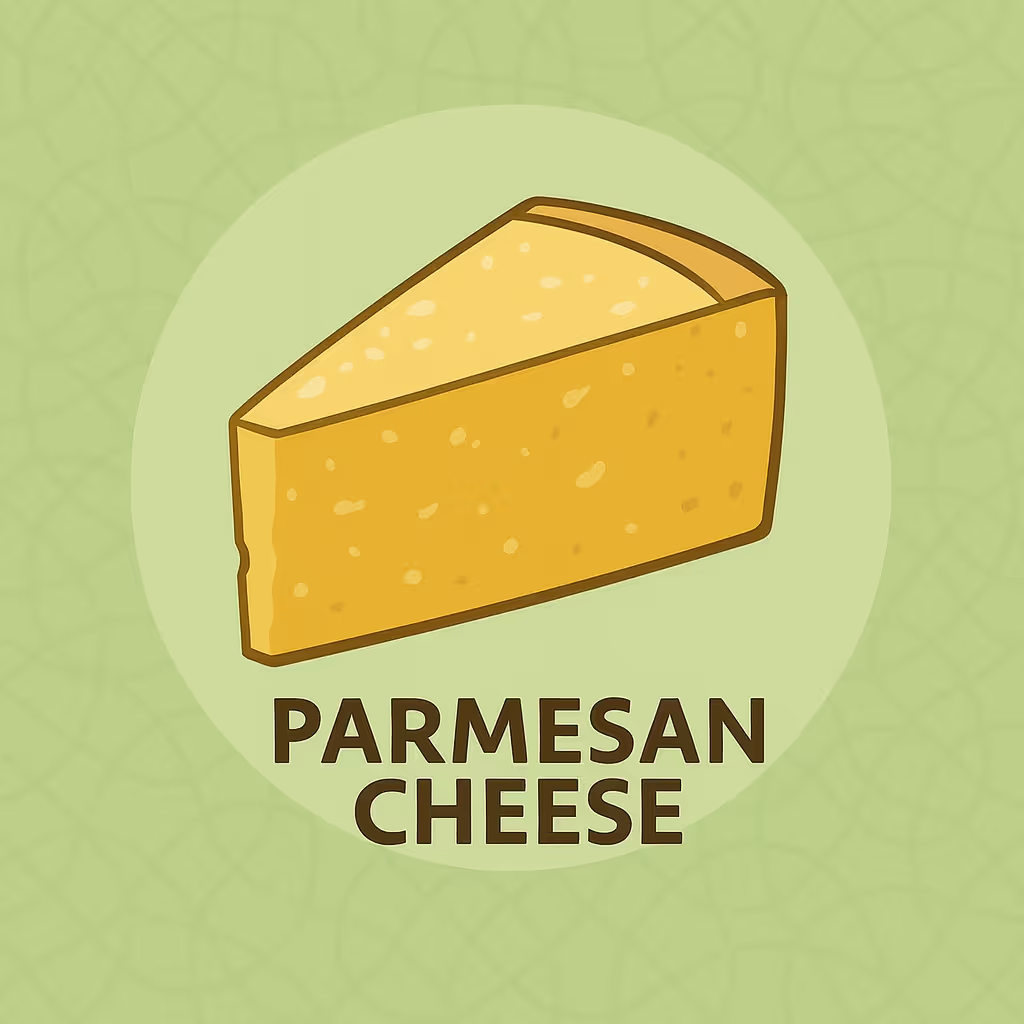Many Muslims wonder about the status of Parmesan cheese – a hard Italian cheese known as Parmigiano-Reggiano – and whether it is halal (permissible) to eat.
The concern stems from the way Parmesan is made: it traditionally uses animal rennet, an enzyme taken from the lining of a calf’s stomach. These calves are not usually slaughtered according to Islamic law, which raises doubts about the cheese’s permissibility.
So, is Parmesan halal? To answer this, we need to understand the Islamic rulings on rennet and how different scholars view cheese made with it.
Why Do Muslims Question If Parmesan Cheese Is Halal?
The ingredient in question is rennet, known in Arabic as infāḥa. Rennet is a substance extracted from the stomach of a young animal (like a calf or lamb) and is used to coagulate milk in cheesemaking.
The Islamic concern arises when rennet comes from an animal that was not slaughtered according to Sharīʿah (Islamic law). Meat and edible parts from improperly slaughtered (non-halal) animals are unlawful to consume. Scholars have differed on whether rennet falls into that category of impurity or not.
If the rennet is taken from a halal animal that was slaughtered Islamically, then all schools of thought agree that such rennet is pure and cheese made with it is halal. In the case of Parmesan, however, the rennet typically comes from calves that were not slaughtered per Islamic guidelines. This scenario puts Parmesan in a grey area where the ruling depends on scholarly interpretation.
Traditional Islamic jurists examined whether something like rennet – an enzyme with no flowing blood – is affected by the animal’s improper slaughter. The key question is: does the rennet become najis (impure) due to coming from a dead animal, or is it still considered pure? The answer isn’t black-and-white; it varies between Islamic schools of thought.
Imam Abu Hanifa’s Ruling – The Hanafi Opinion on Cheese Rennet
In the Hanafi school of Sunni Islamic law, there is a well-known leniency regarding cheeses made with rennet from non-halal animals. This view is attributed to Imam Abu Hanifa (the founder of the Hanafi school) himself.
According to Imam Abu Hanifa’s ruling, rennet from a lawful animal remains halal and pure even if the animal was not slaughtered according to Shariah. In other words, he considered the enzyme extract (infāḥa) to be a substance that does not carry the impurity of death, since “no blood flows through the rennet” and it isn’t a living organ that dies with the animal.
By this reasoning, the rennet doesn’t become impure when the animal dies, so it can still be used to make “halal cheese from non-halal animals.” Under this Hanafi opinion on cheese, the presence of calf rennet in Parmesan would not make the cheese haram.
Multaqa al-Abhar and the Hanafi Tradition
It’s worth noting that this lenient ruling is well-attested in authoritative Hanafi texts. For example, Multaqa al-Abhar – a renowned compendium of Hanafi law by Ibrahim al-Halabi – presents Abu Hanifa’s opinion as the preferred view on this matter. In Multaqa al-Abhar and its commentaries, scholars mention that “the rennet (infaha) and milk of a dead (unslaughtered) animal are pure according to Abu Hanifa (…this is the rajih or dominant view)". This shows how Imam Abu Hanifa’s cheese ruling fits within the broader Hanafi tradition of looking at the essence of the substance: since rennet is basically an enzyme and not blood or flesh, it isn’t treated as carrion.
Differences in Other Schools of Thought
While the Hanafi position (via Imam Abu Hanifa) provides a lenient verdict on rennet, other Islamic schools of thought have taken a more cautious stance on cheeses like Parmesan.
Because of these differences, you’ll find that some Islamic authorities declare most commercial cheeses haram, while others say they are halal as long as the ingredients are from a halal animal species.
This is why there is variation in practice: for example, a Hanafi Muslim might eat regular Parmesan based on Imam Abu Hanifa’s ruling, whereas a Shafi’i Muslim might only eat it if it’s certified halal or uses vegetarian rennet.
Conclusion
In summary, Parmesan can be considered halal according to the Hanafi school of thought, especially based on Imam Abu Hanifa’s opinion as documented in texts like Multaqa al-Abhar.
He reasoned that rennet from a calf (or other halal animal) remains pure even if the animal wasn’t slaughtered Islamically, thus the cheese made from it is permissible. This lenient ruling has been a source of ease for Muslims historically, allowing them to enjoy cheese without undue hardship.
However, it’s important to appreciate the difference of opinion: other schools view such cheese as impure and advise Muslims to avoid it.
For general Muslim readers, the takeaway is that there is a well-grounded Islamic opinion that Parmesan is halal. At the same time, out of respect for differing scholarly views, one may choose Parmesan alternatives made with microbial or plant rennet (many are available now) if they wish to be extra cautious. Both approaches have scholarly backing.
FAQs
Can Muslims have rennet?
Imam Abu Hanifa states that rennet from a calf (or other halal animals) remains pure even if the animal wasn't slaughtered Islamically, thus the cheese made from it is permissible. Under the Hanafi school of thought Muslims can have rennet.
Can you get halal rennet?
Yes, halal rennet is available to buy, however, it is harder to come across.
What type of cheeses can all Muslims eat, regardless of their school of thought?
All Muslims, regardless of the school of thought that they follow, can have cheeses that uses halal rennet.


















.avif)

Lorem ipsum dolor sit amet, consectetur adipiscing elit. Suspendisse varius enim in eros elementum tristique. Duis cursus, mi quis viverra ornare, eros dolor interdum nulla, ut commodo diam libero vitae erat. Aenean faucibus nibh et justo cursus id rutrum lorem imperdiet. Nunc ut sem vitae risus tristique posuere.
Lorem ipsum dolor sit amet, consectetur adipiscing elit. Suspendisse varius enim in eros elementum tristique. Duis cursus, mi quis viverra ornare, eros dolor interdum nulla, ut commodo diam libero vitae erat. Aenean faucibus nibh et justo cursus id rutrum lorem imperdiet. Nunc ut sem vitae risus tristique posuere.